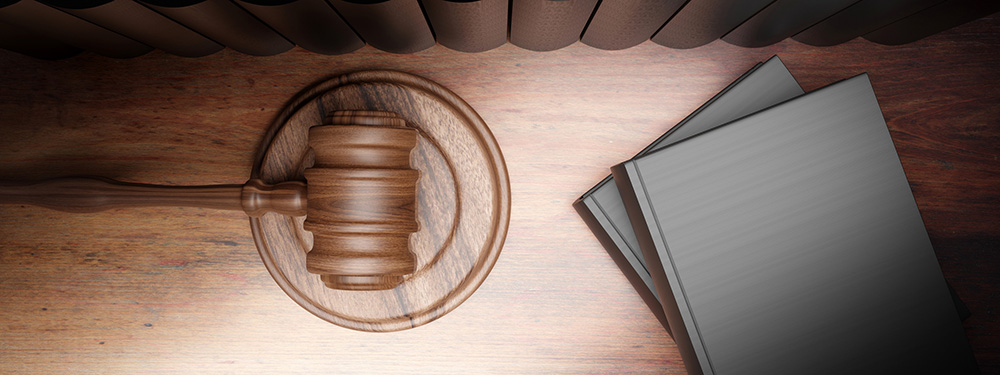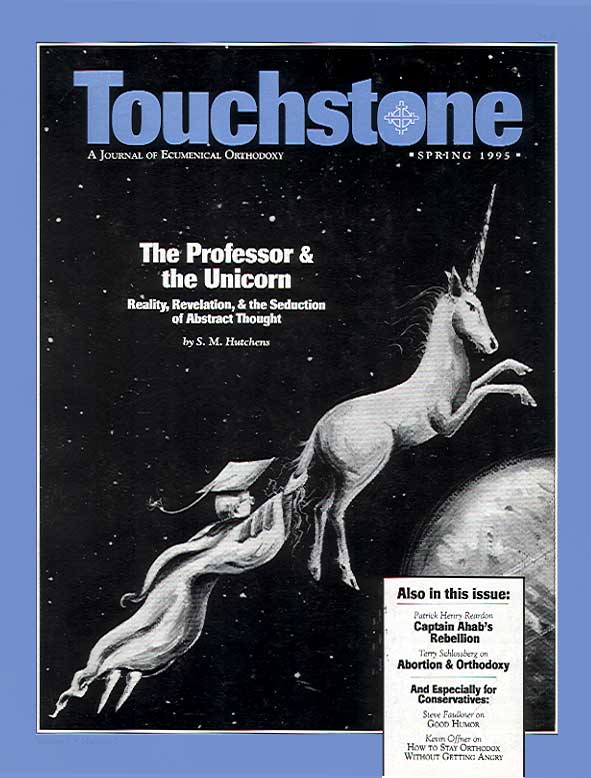Captain Ahab’s Rebellion
A Novelist Looks at Predestination
by Patrick Henry Reardon
Back in 1923, just when Herman Melville was finally coming to be regarded as one of America’s major literary figures, but still quite a while before Albert Camus dared name him “among the greatest geniuses of the West,”1 his most famous novel was subjected to a passing analysis by Aldous Huxley: “It always seems to me that Melville often defeated his own ends in Moby Dick by protesting too much. . . .”2 Whatever one may think of this as a stylistic criticism, there is no doubt that Moby Dick is a work heavy with protest. Indeed, it is almost nothing but the account of a protest, even a rebellion. While he was still writing it, Melville told his fellow seafaring author, Richard Henry Dana, that it would “be a strange sort of book,”3 and he elsewhere remarked that he could not recommend the story to just anybody.4
The protest in this novel is theological, and the great protester is Captain Ahab, metaphysical rebel against the divinely appointed conditions of existence, challenging “the insufferable splendors of God’s throne,” “consumed with one unachieved revengeful desire,” convinced that “right worship is defiance,” and uttering the sacrilegious doxology: “Oh, thou clear spirit, of thy fire thou madest me, and like a true child of fire, I breathe it back to thee.”
Before looking at the cause of the sea captain’s complaint and the nature of his rebellion, we do well to remark that Ahab is not Melville himself, who speaks more properly through the book’s narrator, Ishmael. The critic Randall Stewart sagely observed that Melville did not necessarily approve of Ahab, “any more than Shakespeare necessarily approved of Macbeth, or Milton of Satan.”5 Indeed, Melville’s truer voice, the narrator Ishmael, repeatedly describes Ahab’s quest as monomaniacal and insane.
As we shall see, however, if Ahab is not Melville, he certainly is a voice coming from inside Melville, who will take care that this voice of protest is granted a full and proper hearing. I will argue, besides, that Melville is not really convinced that the old sea captain is altogether wrong. Even Ishmael, by preference a disciple of Rousseau and sharing his optimism about the native innocence of human beings, cannot disregard the suspicion that a deep, inveterate evil lies at the heart of things, so that Ahab’s hopeless rebellion may be, at the last, the more truly honest course.
The Nature of the Complaint
Ahab’s protest has been credited to various causes. Henry A. Murray, for example, regarded him as Melville’s voice of rebellion against the repressive ethics of Calvinist Christianity.6 There is some merit to this approach, given Ishmael’s views on the superiority of pagan innocence over the dubious virtue of most Christians whom he knew. The narrator’s assessment certainly represents Melville’s own view, and it was clearly on his mind at that period. For example, his novel Pierre, published the following year (1852), is largely a critique of what he considered the baneful influences of Christian idealism.7 I hope to show that a certain aspect of Calvinism is a significant factor in Ahab’s complaint, but it is not Calvinist ethics.
However, Ahab is certainly protesting a great deal more than a particular religious system. He rebels against the very structure of human existence, challenging the validity of metaphysics and religion altogether. The operative query in this book was posed by Ahab’s second officer, Stubb: “I wonder, Flask, whether the world is anchored anywhere.” This strictly metaphysical and even theological question, this wonder about the anchoring of reality, is Melville’s very own, reflected just a few years later (1856) in Nathaniel Hawthorne’s well-known description of a recent visit from him:
Melville, as he always does, began to reason of Providence and futurity, and of everything that lies beyond human ken, and he informed me that he had “pretty much made up his mind to be annihilated”; but still he does not seem to rest in the anticipation; and, I think, will never rest until he gets hold of a definite belief. . . . He can neither believe, nor be comfortable in his unbelief; and he is too honest and courageous not to try to do one or the other. If he were a religious man, he would be one of the most truly religious and reverential; he has a very high and noble nature, and better worth immortality than most of us.8
He could neither believe nor rest in unbelief. Everything was to be doubted, even the value of doubt itself. Thus, Melville’s spokesman, Ishmael, endeavors to maintain on metaphysical questions the perfectly open mind of the skeptic, “that strange perplexity of inert irresolution,” as he watches the perilous rebellion of Ahab. On the book’s first page Melville tells us that the silence of the letter “h” in the pronunciation of “whale” is no accident; by pointing to something that is not really there, by both existing and not existing, it “almost alone maketh up the signification of the word. . . .” Likewise, the very lack of a distinct color in the hated white whale “shadows forth the heartless voids and immensities of the universe, and thus stabs us from behind with the thought of annihilation,” so that “stricken Ahab stood . . . with a crucifixion in his face; in all the nameless regal overbearing dignity of some mighty woe,” with his “aspect of nailed firmness, only dashed with a certain wild longing, if not hopefulness.”
The Child of Adam
We are, after all, a fallen race. Ahab is the universal rebel on behalf of Adam’s many children, for he “voices the implied protest of all humanity.” Melville describes “Adam, staggering beneath the piled centuries since paradise,” although he “died sixty round centuries ago.” Gone forever are “those primeval times when Adam walked majestic as a god.” Now there remains only death, that “speechlessly quick bundling of a man into Eternity.”
Humanity is but an assembly of metaphysical aliens. In one of the novel’s best metaphors, Melville describes us as strangers, destined to be at last interred in the “Potters’ Fields of all four continents.” This radical sense of inevitable doom prompts even Ishmael, who would prefer the optimism of Rousseau over such melancholy reflections, to wonder if the scar on Ahab’s flesh may not prove to be “a birthmark on him from crown to sole.” Intent on an “audacious, immitigable, and supernatural revenge,” anger against humanity’s unvarying alienation becomes in Ahab “the one and only all-engrossing object”; he is “horribly conscious of something fatally wrong,” “gnawed within and scorched without, with the infixed, unrelenting fangs of some incurable idea.”
Mankind must be avenged. In his hunt of the white whale Ahab endeavors to retaliate for the immense metaphysical injustice of the Adamic tragedy.9 He sets himself against “all that maddens and torments; all that stirs up the lees of things; all truth with malice in it; all that cracks the sinews and cakes the brain.” In short, it was as if “all evil, to crazy Ahab, were visibly personified, and made practically assailable in Moby Dick. He plied upon the whale’s white hump the sum of all the general rage and hate felt by his whole human race from Adam down.”
The Wisdom of Solomon
But can we really choose to do anything in this world? Nobody in Moby Dick seems to think so. The impression that all human events are predetermined is one of the novel’s most dominant motifs. Ishmael himself opens this theme early: “And, doubtless, my going on this whaling voyage formed part of a great programme of Providence that was drawn up a long time ago.”
Ishmael claims to have found such an idea in the Book of Ecclesiastes, for when that “unfathomably wondrous Solomon” taught that “all is vanity,” he spoke “a wisdom that is woe.” All marvels “are mere repetitions of the ages; so that for the millionth time we say amen with Solomon—Verily there is nothing new under the sun.” Thus, the ship Pequod is a “predestinated craft,” “blindly plunged like fate into the lone Atlantic”; its “captain and crew become practical fatalists.” In short, “what’s to be will be”; “it’s too late to make any improvements now. The universe is finished; the copestone is on, and the chips were carted off a million years ago.”
All reality is forever fated by a blind, capricious, but inevitably sovereign will—in Moby Dick this is universally taken to be the truth about things. In the pessimism of this persuasion there are countless references to “the endlessness, yea, the intolerableness of all earthly effort,” the “predestinated day,” “the great necessities,” “some curious fatality,” “mysterious fatality,” “strange fatality” that “pervades the whole career of these events, as if verily mapped out before the world itself was charted.” The universe and all of life are but the senseless weaving of a god who is deaf to his very work: “The shuttle flies—the figures float from forth the loom; the freshet-rushing carpet for ever slides away. The weaver-god, he weaves; and by that weaving is he deafened, that he hears no mortal voice.”
The very concept of human history (and thus, too, of salvation history) is excluded by this thesis of total predetermination, for the distinguishing difference between human history and what is called natural history is the former’s postulate of free choice. As another New Englander, William James, was to argue a few decades later, if we are not free in our choices, then all things are necessary, and if everything is necessary, then nothing is possible, and if there is no such thing as possibility, then there is nothing new, and if there is nothing new, there is no such thing as history.10
The Creator of Sharks
But if everything is predestined, if all things that are must be, then evil too must be.11 So God is as responsible for evil as for good. In this line of reasoning, damnation is not a divine afterthought. God himself must be held to account for the metaphysical injustice of man’s plight. Of this, Captain Ahab entertains no doubts.
So it is not surprising to find this novel speaking of divinity in terms of diabolism. Indeed, the distinction between theology and demonology wanes very thin in Moby Dick. The narrator, essaying neutrality on the question, tells the reader: “suspend your decision about the propriety of devil-worship, and the expediency of conciliating the devil.” A “horrible vulturism of the earth” prompts first-harpooner Queequeg to sum up the divine origin of evil: “De god wat made shark must be one dam Ingin.”
Ishmael speaks of “the instinct of the knowledge of the demonism in the world.” He observes that the whale bore “an everlasting Mephistophelean grin on his face,” and in the sea itself “there lurked a devilish charm,” for it was replete with the “swift madness and gladness of the demoniac waves.” Late in the story Ahab would utter the epitomizing exclamation: “Oh, devilish tantalization of the gods!”
So Ahab pursues the whale, for only thus can he be faithful to “the eternal, living principle or soul in him.” Against the cruel impersonality of the universe, he will assert his own personality. In protest to all predetermined evil, his rebellion drives him “to his one supreme purpose,” and “that purpose, by its own sheer inveteracy of will, forced itself against gods and devils, into a kind of self-assumed, independent being of its own.” Finally he tramples on the ship’s quadrant, asserting that never again will he be directed from on high.
Ahab solemnly proclaims his rebellious independence: “In the midst of the personified impersonal, a personality stands here. Though but a point at best; whencesoe’er I came; wheresoe’er I go; yet while I earthly live, the queenly personality lives in me, and feels her royal rights.”
Still, Ahab suspects that his very rebellion may be nothing more than the execution of yet another divine/demonic decree. His very undertaking may be only “a devil’s chase,” a pursuit “round perdition’s flames.” Even in striving against the devil, he is on the devil’s side, because if he is right there is no other side. One recalls the scene where he baptizes his harpoon in blood: “I do not baptize you in the Name of the Father, but in the name of the devil.” In a letter to Hawthorne, to whom Moby Dick is dedicated, Melville admitted that this baptismal formula was the secret motto of the whole book.12
And what about Melville’s more general spokesman, Ishmael? Many of his own reflections, particularly about predestination, seem identical with those of Ahab. Even as he criticizes the latter’s reckless rebellion, part of him is sincerely sympathetic to his plight, for he recognizes the mind’s difficulty in shaking off the impression of a universal determinism, the very thing that drove Ahab on that wild hunt and the ensuing disaster.13 So powerful is this sense of determination, Ishmael confesses, that it “requires strong decoction of Seneca and the Stoics to enable you to grin and bear it.”
A Necessary Rebellion?
Stubb’s question about the anchoring of the world is, I suggested, the key to Moby Dick. Ahab’s conviction and Melville’s fear is that there is ultimately no “reason” to existence, no logos or meaning. The universe, literally devoid of significance, expresses only a sovereign will, both blind to purpose and deaf to prayer. Things are only because they are decreed to be. Therefore, existence is ultimately not intellgible, not a thing to be understood. It is definitely the nominalist’s world. Because no intelligibility went into its construction, it is not subject to rational investigation or discourse. Existence can only be accepted or rebelled against, for it is the embodiment purely of will, not of wisdom.
Nor, moreover, is Melville’s world one of benign neutrality, like the tendre indifférence du monde at the end of Camus’s The Stranger. In this respect Camus had the good fortune of being an atheist. No such blessing for Melville, who could “neither believe nor be comfortable in his unbelief.” Thus, Ahab’s universe is destructive and cruel because it is predetermined by a divinity that may as well be a devil. The world in Moby Dick is empty of freedom and meaning, both excluded by a predestination at once capricious and malicious.
Now to the Christian reader this rebellion against divine predestination should seem a passing curiosity. He should be disposed to say that Ahab’s rebellion was unnecessary because it was inspired by a grievous misunderstanding. In the New Testament, after all, predestination has nothing whatever to do with evil. It serves solely to describe the life in Christ, nor is it once mentioned in connection with sin, despair, or damnation. It has to do only with Christology and God’s redemptive love and the Church’s consolation in the Holy Spirit.
Nor is predestination, in the New Testament, a philosophical concept. Known only in Christ and by those who belong to Christ, it does not pertain to any theory about the relationship of God’s sovereignty to his omniscience, as would later be the case after the speculations of Scotus and Ockham. This latter notion of predestination, inherited through popular Calvinism, was undoubtedly the source of Melville’s problem.
It was not Melville’s problem alone, however, nor has it shown many signs of going away. This lingering, nightmarish belief in the antecedence of arbitrary omnipotence to divine wisdom, leading to the appalling specter of specific human beings arbitrarily predestined to eternal damnation by a sovereign decree logically prior to God’s foreknowledge of their evil deeds, necessarily makes God the author of evil. Resting on certain unconvincing philosophical speculations, this bizarre notion has nothing to do with the teaching of the New Testament. Nor, except for a handful of usually misunderstood passages in St. Augustine14, has it any support among the Fathers of the Church, East or West. Hans Urs von Balthasar justly called it “the deepest tragedy in the history of Christian theology.”15 Such an understanding of predestination certainly makes God capricious, even monstrous. It is no wonder either that Melville could not believe in him or that Captain Ahab should want to kill him. •
Notes:
1. Camus’s Introduction to a French translation of Moby Dick,
in Théâtre, Récits, Nouvelles, Bruges: Pléiade,
1962, p. 1907.
2. Letters of Aldous Huxley, New York: Harper and Row, 1969, p.
215.
3. Letter of May 1, 1850, The Letters of Herman Melville, New Haven:
Yale University Press, 1960, p. 108.
4. Cf. letter to Sarah Huyler Morewood in September of 1851, ibid .,
p. 138.
5. American Literature and Christian Doctrine, Baton Rouge: Louisiana
State University Press, 1958, p. 96.
6. “In Nomine Diaboli,” Moby Dick Centennial Essays,
Dallas: Southern Methodist University, 1953, pp. 12–15.
7. Cf. William Braswell, Melville’s Religious Thought, New
York: Pageant, 1959, pp. 57–73. To concentrate the focus of this article,
I leave aside several other attempts to interpret Ahab’s rebellion, such
as the not very helpful thesis of W. Somerset Maugham ( The Art of Fiction,
Garden City: Doubleday, 1955, p. 203) that Ahab is the voice of Melville’s
repressed homosexuality.
8. The Portable Hawthorne, New York: Viking, 1969, p. 651.
9. Cf. Amos Wilder, Theology and Modern Literature, Cambridge: Harvard
University Press, 1967, pp. 32f.
10. I endeavor here to summarize part of James’s argument in The
Will to Believe and Other Essays in Popular Philosophy, New York: Longman’s,
Green, 1897, pp. 145–183.
11. Thus St. Anselm ( De Veritate 8) reasons that, because debet
esse characterizes both what God does and what he permits to be done, evil
must be.
12. Letter of June 29, 1851, Letters of Herman Melville, p. 133.
13. “The unfolding of this theme will remind us that when an ideology
as powerful as Calvinism leaves a man, it does not leave him entirely. Large
and unexpected chunks often stay behind.” William Hamilton, Melville
and the Gods, Chico, California: Scholars Press, 1985, p. 8. Cf. also Edwin
Haviland Miller, Melville, New York: George Braziller, 1975, p. 130.
When I speak of “Calvinism” in this article, I mean the expression
in the popular sense known to Melville, leaving to experts on the subject the
question of how much of this sense can be traced to the Reformer himself.
14. St. Augustine’s is very different from the later view, as when he
says, for example, that “predestination cannot exist without foreknowledge,
though foreknowledge may exist without predestination.” ( De Praedestinatione
Sanctorum, 10.19. cf. also De Correptione et Gratia 12.37)
15. Sponsa Verbi, Einsiedeln, Switzerland: Johannes Verlag, 1961,
p. 308.
Patrick Henry Reardon is pastor emeritus of All Saints Antiochian Orthodox Church in Chicago, Illinois, and the author of numerous books, including, most recently, Out of Step with God: Orthodox Christian Reflections on the Book of Numbers (Ancient Faith Publishing, 2019).
subscription options
Order
Print/Online Subscription

Get six issues (one year) of Touchstone PLUS full online access including pdf downloads for only $39.95. That's only $3.34 per month!
Order
Online Only
Subscription

Get a one-year full-access subscription to the Touchstone online archives for only $19.95. That's only $1.66 per month!
bulk subscriptions
Order Touchstone subscriptions in bulk and save $10 per sub! Each subscription includes 6 issues of Touchstone plus full online access to touchstonemag.com—including archives, videos, and pdf downloads of recent issues for only $29.95 each! Great for churches or study groups.
Transactions will be processed on a secure server.
more from the online archives

37.5—Sept/Oct 2024
Why Law Schools Can't Teach Law
A sidebar to How Law Lost Its Way by Adam MacLeod
calling all readers
Please Donate
"There are magazines worth reading but few worth saving . . . Touchstone is just such a magazine."
—Alice von Hildebrand
"Here we do not concede one square millimeter of territory to falsehood, folly, contemporary sentimentality, or fashion. We speak the truth, and let God be our judge. . . . Touchstone is the one committedly Christian conservative journal."
—Anthony Esolen, Touchstone senior editor








